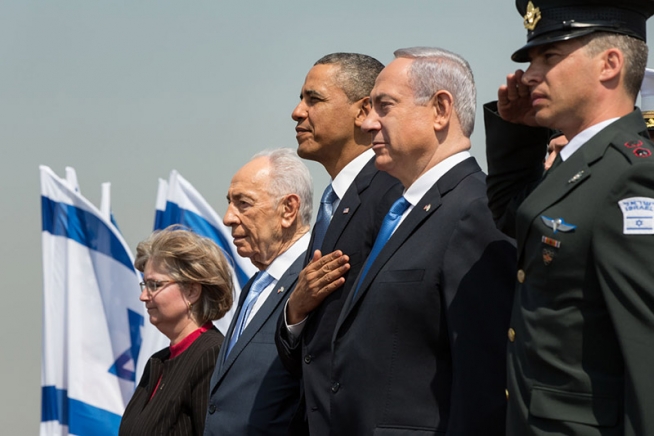
Now that the dust has settled on President Barack Obama’s much-anticipated trip to Israel, it is possible to analyse the significance of the visit. The trip — the first foreign visit of his second term — carries important implications for US foreign policy. Rather than providing the breakthrough for which many had hoped, it demonstrated that Obama — unlike other second-term US presidents, who have staked their legacies on foreign policy — is interested primarily in securing a domestic legacy.
Obama’s ambitions are centred on reversing the arrangement that has dominated US politics since Richard Nixon’s election in 1968. He hopes to ensure that a moderate Democratic Party forms the core of domestic politics and policymaking, with the Republican Party consigned to the periphery.
The centrepiece of Obama’s visit was his address in occupied Jerusalem, in which — employing his characteristically compelling rhetoric — he won over the sceptical Israeli public by appealing to their sense of morality, asking them to imagine the conflict from a Palestinian perspective. And yet, while the speech was widely considered a successful exercise in public diplomacy, it did not herald renewed US involvement in peace negotiations. Rather, it portends a continuation of America’s hands-off approach to the Israel-Palestine conflict.
Obama’s decision to address the Israeli people instead of their leaders is telling. He recognises that the current political climate is not conducive to successful peace negotiations. In Israel, Prime Minister Benjamin Netanyahu has crafted a centre-right coalition dominated by prominent pro-colonisation leaders, including Housing Minister Uri Ariel of the Jewish Home Party and Defence Minister Moshe Yaalon of Netanyahu’s Likud.
The only notable exception, Justice Minister Tzipi Livni, seems to have been appointed merely to provide a veneer of official commitment to the peace process. Finance Minister Yair Lapid, a moderate, is removed from the peace process.
Moreover, despite Netanyahu’s 2009 declaration of support for a two-state solution, which he reaffirmed during Obama’s visit, Likud has embraced a pro-colonisation position, exemplified by Israel’s planned construction in the E1 corridor, one of the West Bank’s most sensitive areas. Meanwhile, the political situation in Palestine — characterised by the erosion of President Mahmoud Abbas’s legitimacy — and the region’s overall instability are contributing further to the decay of the peace process.
Rather than expending significant political capital trying to press an unreceptive Israeli government and a fractured Palestinian establishment to pursue peace, Obama used his visit to shift the discourse — and the responsibility for achieving a peace agreement — to the Israeli (and Palestinian) public. Indeed, beneath Obama’s rhetoric about empathy and the morality of peace was a clear message about the future of the peace process: the push for negotiations must come from the streets of Israel and Palestine. It will not come from Washington.
This was a tactical move that allowed Obama to address the conflict without having to put any additional skin in the game, while advancing his visit’s underlying objective of reducing Israel’s ability to distract from his domestic goals. The price of Obama’s approach is that it denies any potential for progress toward peace.
Furthermore, Obama’s embrace of Israel during his visit has undermined America’s role as an honest broker in future negotiations — and no credible candidate has surfaced to fill the position. The trip also heralds a dramatic shift in Israel’s relationship with Obama, who has been criticised throughout his presidency for supposedly failing to provide sufficient support to America’s strongest ally in the Middle East. The recent Senate hearings to confirm Chuck Hagel’s appointment as secretary of defence, which involved aggressive questioning about the former senator’s commitment to Israel, reflected that criticism.
Facing continuing battles with Congress, mid-term elections next year, and increasing instability in the Middle East (including the threat of unilateral Israeli action against Iran’s nuclear facilities), Obama clearly believes that now is not the time to push for a peace agreement, because it is unlikely to succeed. Instead, he is working to make Israel a non-issue by quieting domestic critics and allaying Israel’s security fears.
To this end, Obama has withdrawn his support for preconditions to peace negotiations, indicating to Palestinians that they should not expect a freeze on colony-building ahead of talks. In his occupied Jerusalem address, he reaffirmed America’s commitment to preserving Israel’s security while pledging to control Syria’s chemical-weapons stockpile and to prevent Iran from acquiring nuclear weapons.
This strategy has already produced results. Netanyahu’s apology to Turkey for the commando raid on a Gaza-bound Turkish ship in 2010 was a major diplomatic victory for Obama. More important, the absence of a contentious Netanyahu-Obama relationship will deny Republicans an easy target in mid-term elections. (Such low-hanging fruit has been increasingly scarce for the Republican Party, which is beleaguered by the perception that it has been hijacked by its most extreme elements.)
In the unlikely event that circumstances change, Obama could step in as an active peacemaker, giving his trip to Israel historic significance as a turning point in Israel-Palestine relations. For example, Israeli public opinion could become galvanised in support of peace in the wake of the occupied Jerusalem address, or US Secretary of State John Kerry could make headway in initiating talks. Livni might find a strong voice in Israel’s government; the Labor Party could replace Jewish Home in a new governing coalition; or Netanyahu’s attitude could change as he seeks to secure his legacy.
Without a drastic change in Israeli politics and society, however, Obama will continue to play it safe, minimising his vulnerabilities. As he moves closer to solidifying the Democratic Party’s position in US politics, Israel will continue to construct colonies and become increasingly isolated. We can only hope that the consequences of Obama’s foreign-policy sacrifice are not too high a price to pay for the establishment of his domestic legacy.
Ana Palacio, a board director at the Atlantic Council, is a former foreign minister of Spain. This piece originally appeared on Gulf News.
Photo credit: White House/Pete Souza
Image: p032013ps-0072.jpg
